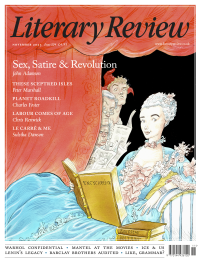Guy Stevenson
The Other Physicist
The Maniac
By Benjamín Labatut
Pushkin Press 420pp £20
The Maniac is Benjamín Labatut’s second creative history of the humans behind the atomic bomb, computers and AI. The follow-up to his International Booker Prize-shortlisted When We Cease to Understand the World, it features some of the same cast and approaches all of the same themes, albeit from marginally different angles. Starting with an epigraph from a 13th-century mystic, Labatut reconceives mathematicians and physicists as terrible explorers of the modern world – mad, dangerous visionaries whose quests to understand how the universe works were not only epoch-shaping but also poetic. Like his hero, W G Sebald, Labatut makes use of real quotations, photos and embellished personal recollections, turning abstract maths into full-blooded psychodrama.
The book opens in 1930s Mitteleuropa, a world upended by fascism and quantum mechanics. Through the intimate thoughts of real-life Hungarian and German mathematicians and scientists, Labatut gives the background to the maddening of reason that led to Hiroshima. It was a time, we hear, of ‘a crisis of the foundations of mathematics’, in which logicians ‘could no longer trust their own arguments’. At the centre of this world, and at the heart of the book, is the Faustian Johnny von Neumann, an inspired thinker with total trust in his own logic, bent on uncovering the ‘mathematical basis for reality’. The star also of Labatut’s earlier novel, von Neumann is a handy vehicle for channelling 20th- and 21st-century moral-technological dilemmas. He was one of an extraordinary number of Hungarian émigrés who helped develop the atomic bomb, building the computer that detonated it and advising Truman on which cities to target. Less famous than Oppenheimer or Teller (and flashier, according to this account), he also produced the blueprints for the personal computers of today and for the AI technologies that currently have everyone in a spin.
Caught between his ‘otherworldly capacity to see into the heart of things’ and a ‘childlike moral blindness’, von Neumann is presented successively as a spoilt, brilliant brat during his early years in Budapest, a prodigious 25-year-old professor in Berlin and the go-to mathematician for the American government in the

Sign Up to our newsletter
Receive free articles, highlights from the archive, news, details of prizes, and much more.@Lit_Review
Follow Literary Review on Twitter
Twitter Feed
Russia’s recent efforts to destabilise the Baltic states have increased enthusiasm for the EU in these places. With Euroscepticism growing in countries like France and Germany, @owenmatth wonders whether Europe’s salvation will come from its periphery.
Owen Matthews - Sea of Troubles
Owen Matthews: Sea of Troubles - Baltic: The Future of Europe by Oliver Moody
literaryreview.co.uk
Many laptop workers will find Vincenzo Latronico’s PERFECTION sends shivers of uncomfortable recognition down their spine. I wrote about why for @Lit_Review
https://literaryreview.co.uk/hashtag-living
An insightful review by @DanielB89913888 of In Covid’s Wake (Macedo & Lee, @PrincetonUPress).
Paraphrasing: left-leaning authors critique the Covid response using right-wing arguments. A fascinating read.
via @Lit_Review